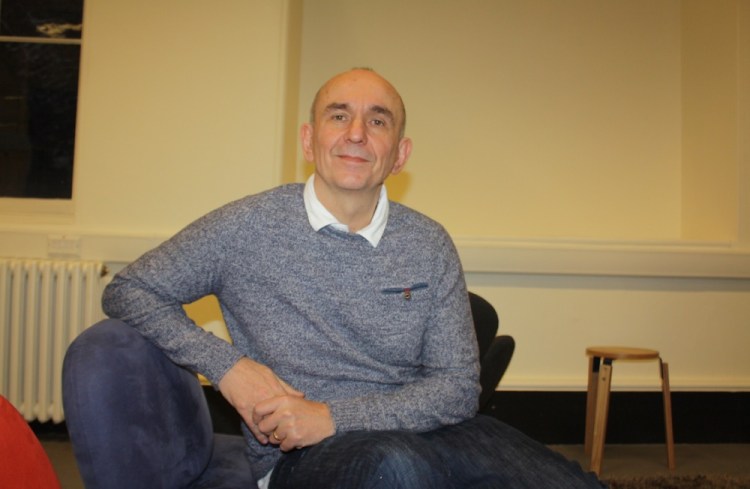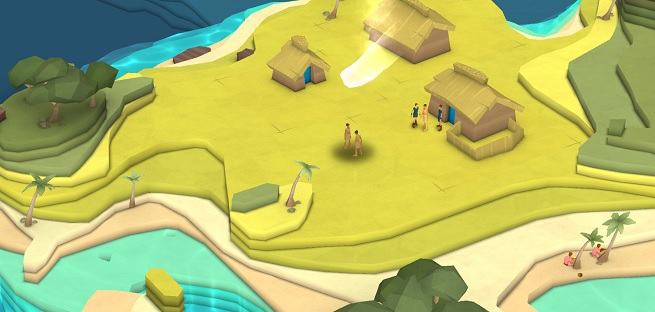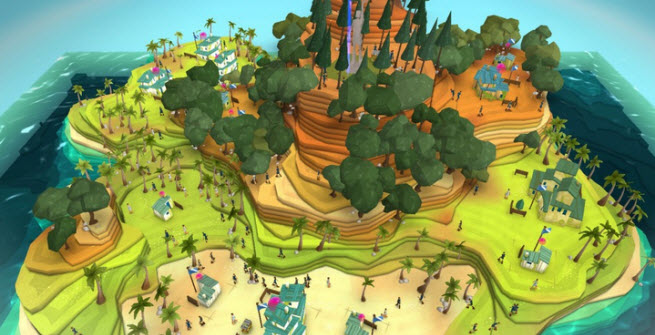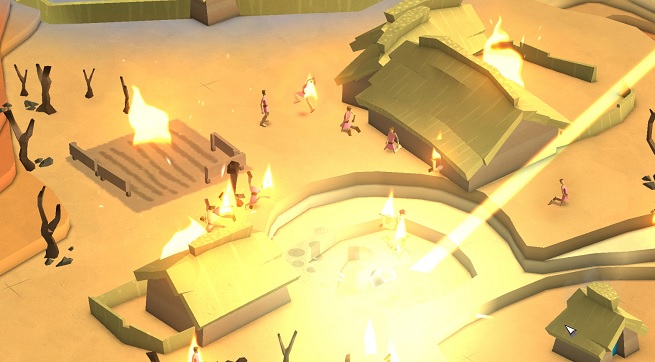GamesBeat: Lots of winners and losers out there.
Molyneux: Lots of winners and losers, yes. If you spoke to VCs especially, I would be surprised if they were too excited about free-to-play compared to a couple of years ago.
GamesBeat: Some very well-funded companies have announced and not gone anywhere. They’ve launched and fallen apart. Even the venture-backed guys can’t guarantee results.
Molyneux: The problem is this middle ground. The concept of consumers enjoying something before they pay money for it is a great concept. That does get it in front of a lot more people. But that has to evolve to a new level. I don’t think, if I look at what’s happened in the most popular games, there’s that innovation coming through. It’s all different shades of the same color. What it needs is a new approach.
That was my thinking about this new title. If I’m going to do free-to-play, I can’t rely on any of the foundation stones other people rely upon, even though that’s hugely risky, if I’m going to have a breakthrough success. There are these big things I started writing on the wall. If I was going to pay any money, these would be the things that would help me do it.
GamesBeat: How do you feel about the English gaming industry? It has a very interesting concentration here.
Molyneux: It does. I’m a mentor to quite a few little businesses. In Guildford there’s an enormous — there must be about 20 little development teams. In fact, I’m trying to — no one has ever brought all those people together, even though Guildford is probably two or three miles across. We’ve never met. That would be a fascinating thing to push. There’s myself and Hello Games and Media Molecule and Lionhead and Sony and Electronic Arts, and we’ve never come together.
As far as Britain is concerned, Britain is and always has been a nation of shopkeepers. The equivalent now is indie developers. These shopkeepers spring up and fall down and spring up again. In a bizarre way, because VC investment isn’t as mature or as easy to get as it is in San Francisco, it means that these companies aren’t burning through millions. A lot of these smaller innovational companies are in tiny bedrooms, like Hello Games.
My feeling at the moment is that the days of the true indie spirit that Microsoft and Sony got worried about, it’s fading now. A few of those indies will be bought out by publishers. A lot of them will wither and die as small companies do. Some of them, very few, will go on to build successful companies.
GamesBeat: Have you felt any interest in some of these new things that are starting to emerge, like virtual reality or augmented reality?
Molyneux: I saw a very early prototype of Microsoft’s project three years ago. It’s a magical experience, putting this thing on your head. When I tried it, it was huge and had loads of wires, so it was great to see it in a small form factor.
There is something I always get pissed off about with those things. It’s when hardware manufacturers say this absolutely rubbish line – “We can’t wait to see what developers do with it.” That’s like saying, “Right, we’ve done it now, over to you.” I don’t think that works. Any new piece of tech, whether it be Oculus Rift or something like Kinect, needs almost twice the investment in a real defining application than it has had in the hardware. Maybe the development community will be thrown this stuff and we’ll spend a few hours playing around with it, but I’d love to see a defining experience.
The defining experience for augmented reality is a challenge. I spent six months trying to get my head around what a defining experience for AR would be like. I found it quite challenging to think of a game, per se. It was easier to think of AR in terms of assisting in things like hobbies. You saw in their concept video, repairing the sink. It’s easy to think of that. Actual games are quite challenging, because it’s so completely different than standing in front of a screen. There are more reasons than just the fact that it’s projected into the world. It’s going to be very challenging to come up with a signature application that defines that experience.
At the moment, without that, it’s like having an iPhone and Apple saying, “Well, it’s got touch, now we can’t wait to see what developers do with it.” They didn’t do that. They gave us a wonderful experience out of the box, and that’s what this thing has to have, a wonderful experience.
GamesBeat: It’s easier for you to wrap your head around mobile as your platform?
Molyneux: I still think touch has a long way to go. I love the fact that everybody’s got one of these things in their pocket. I still feel that the defining game for this platform has yet to be created. At the moment you could say it’s Clash of Clans or Candy Crush, but I’d be disappointed if that was the end of the journey for entertainment on these devices. You need to think out of the box.
There’s a lot of money to be made in taking existing genres and adapting them for this device, but to me I find it fascinating to think about what new genres are sympathetic with this device. It’s not just the device that excites me. It’s the fact that it’s with you all the time. For a game designer that’s the thing. It’s part of your DNA now, almost. The sorrowful look on your face when you said, “My phone’s not working,” that proves the point.
I love the idea that an experience should be able to adapt itself. If you’re waiting for a meeting or you have a five-hour flight, you should have an experience that allows you to play on one of these things.
GamesBeat: It’s good to hear that Godus earned you another shot at something bigger.
Molyneux: It was a fantastic bridge. It was a hell of a roller-coaster ride. I’ve never published a game before. Although we had help from DeNA, it was us that did the submissions. We did all the donkey work. Previously, someone like me used to send the code off and go on holiday. That’s completely different now, and it’s been a really energizing experience to go through that.
What I have now — and I haven’t done anything with it yet because I was waiting for the final territory release in Godus – we’ve filmed the entirety of the making of Godus. One of the people claims he can edit these hundreds of hours down into 15 minutes. I don’t know what he’s going to do, but there were some wonderful moments. If I had that playing along with the graphs and charts, I could say, “This game feature did this at this point to this curve and it meant that we were earning this and then we were earning that.”
I’ve always tried to be open about these kinds of things because I don’t see any point in not being open. Anyone can go on App Annie and see how successful you are.
GamesBeat: I don’t see enough people doing these kinds of things that benefit the whole industry. Everyone has the mindset where they say, “I’m a private company. This is my hard-earned data. I’m not going to share it.”
Molyneux: Those days are gone. If you have a business account on App Annie, you can see everyone’s data. My problem is, it’s just part of the picture. That means you can quite often get the wrong end of the stick completely. You can make assumptions about — this is my worry about free-to-play. “Oh, the top 10 is always the same and nobody’s making any money. Those paid-advert games just made a million pounds in a week, so we ought to do advertising games.” It’s incomplete knowledge.
If more people did a bit more in-depth honest post-mortem work on their approach from the start — a talk I’d love to give is, “Okay, here were my assumptions at the start. This is what I implemented. These are the ones that were wrong. Here’s why they were wrong. These are the ones that were right and this is the sort of thing I’m going to build.”
The big issue that faces us all is user acquisition. The fact is that paid user acquisition just doesn’t work. There’s this gulf, this hole developing, where only a very few people can pour money into it because it’s so expensive. With everything in business there is a vacuum. It’s always going to be filled by something. There’s an opportunity for this new breed of publishers. I don’t know what it looks like, but I can feel it about to happen.
GamesBeat: One company, I found it very odd that they said paid user acquisition costs had become so high, and the results were so bad, that they had decided to do TV ads instead. They were at the point where they had some decent traction, so they could afford it.
Molyneux: There’s a hill that, if you get high enough up, you can make it work. User acquisition by television is comparatively competitive. I’ll give you an example. I was talking to one developer. This was unbelievable. He was absolutely serious about this strategy, which was that he had a game with virtual currency, and he was going to add a new tier of virtual currency for the maximum amount you can spend, which I think is $499 or something. He was going to employ people to go on the app store and buy stuff every day. That would push him up the top-grossing charts. He said, “Well, I get 70 percent of the money back, and compared to the cost of user acquisition, if it gets me in the top 10 grossing, it’s worth doing it.” That’s insane. It has to change.
There is a solution to user acquisition already. It’s very easy and very simple. It’s the kings of the internet, the YouTubers. They’re completely unregulated at the moment. You just know that if some of these YouTubers feature your app, it’ll be a success. Many developers I know are specifically making apps so they’ll be featured by YouTubers. The only way you do that is to make an app that makes that YouTuber laugh, or makes him scared. Someone has to turn that into a business.
VentureBeat's mission is to be a digital town square for technical decision-makers to gain knowledge about transformative enterprise technology and transact. Learn More




